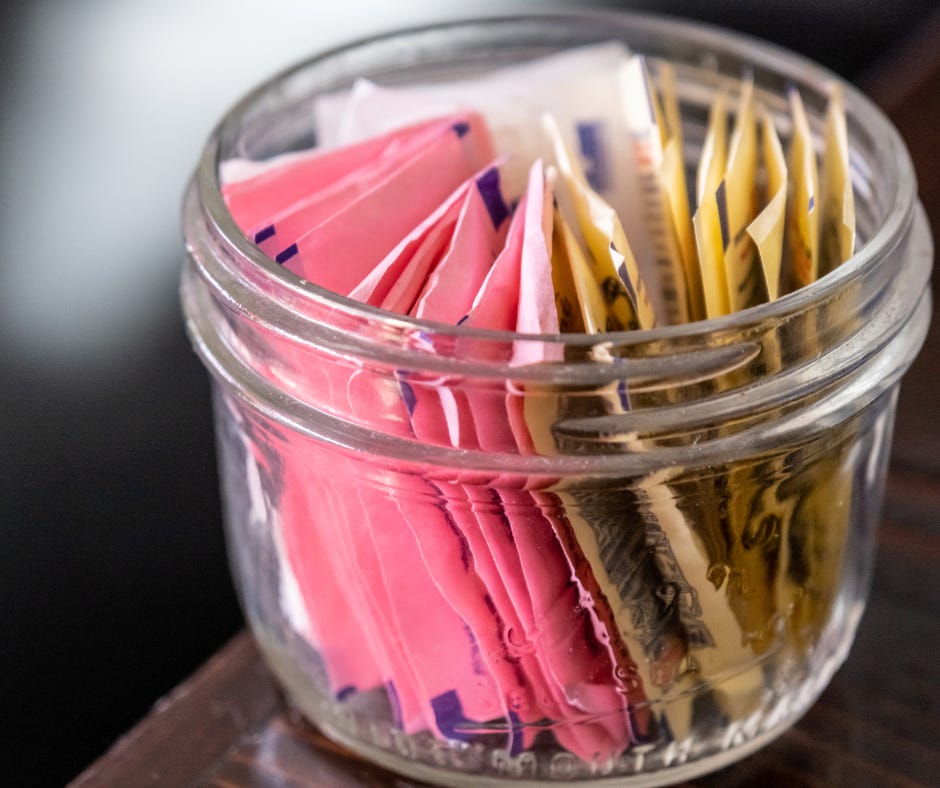Artificial Sweeteners--The Lie That Kills
There are betters alternatives to managing blood sugar
Part of an ongoing series on how to use supplement and behavior-based plans to treat common maladies. To read the detailed supplement plans, order supplements, or download the patient resource sheets, go here to create a free patient account at Fullscript by entering your name and email address: Dr. Mark McDonald’s Fullscript dispensary
Do you think Splenda will protect you from developing diabetes? Think again. Artificial sweeteners do not aid in managing blood sugar. In fact, they promote insulin resistance and weight gain. They are products that promote a lie that kills. To control blood sugar and weight, you must abandon them and adopt healthy alternatives.
It’s understandable why Americans are confused. Artificial sweeteners like aspartame (Nutrasweet), saccharin (Sweet and Low), and sucralose (Splenda) make up a $30 billion industry that has victimized Americans for decades, in particular those struggling with insulin resistance and obesity. The manufacturers have paid off celebrities, oncologists, dietitians, and even the American Dietetics Association itself (ADA), to endorse their products. They put up websites rich in research citations, like “safetyofaspartame.com,” to deny valid claims of health risks associated with their products. The maker of Splenda, on its website, proudly announces, “We help people live happier and healthier lives by making it easier to reduce sugar.” They are as corrupt as Pfizer and Moderna. Even the NIH reports that both Nutrasweet and Splenda are associated with glucose intolerance.
Artificial sweeteners are toxic products. They are being added to every food category: snacks, cookies, candies, beverages, and even frozen foods. You may not even know you’re consuming them unless you carefully read the packaging. You may think that the “calorie free” flavored water on your grocery store shelf is safe to drink, or that the bag of mixed vegetables in the freezer section is nothing but corn and green beans. You would be wrong.
So what are the alternatives?
After carefully eliminating artificial sweeteners from your food and beverages, you must first manage your weight through thoughtful diet and exercise. That means, at a minimum, walking—preferably outdoors—20 minutes a day. It also means a protein-rich diet that focuses on meat, vegetables, and fruit, in that order. Carbohydrates must become a minor contributor to what you eat: Limit your rice, bread, and pasta intake. Simple carbohydrates quickly convert to sugar, something else you should avoid. In place of added sugar, use a tablespoon of honey or maple syrup. They have both been shown to reduce blood sugar, when used in moderation (no more than one tablespoon per day). If you must add something sweet to your food and drink, use stevia, a natural plant-based sweetener that has not been found to affect glycemic control or weight. Agave, darling of the “health food” culture, is particularly awful—it contains a higher sugar concentration than high fructose corn syrup.
You may want to consider using targeted supplements as well. There are several that have been proven to improve glycemic control and limit weight gain.
Berberine, a plant extract commonly used in Chinese herbal medicine, has recently become quite popular with those trying to achieve better management of their blood sugar levels. Perhaps surprisingly, it actually works. You can read about what the NIH reported regarding the benefits of berberine in the treatment of type II diabetes here.
A common and inexpensive food that can be used as a supplement to help with blood sugar control and weight loss is chia seeds. Simply consuming one ounce a day of chia seeds mixed with water reduces blood sugar levels by 39%. A recent NIH study described them as a “therapeutic weapon in metabolic disorders.” The article is worth reading. In addition to describing how chia seeds help manage blood sugar and weight, it also classifies the health benefits of chia seeds into several categories:
suppresses chronic disease risk, including GI‐tract‐related diseases, cardiovascular disease, and various types of cancer (by acting as an anti-oxidant)
supplies critical vitamins, including B vitamins (niacin, folic acid, thiamine, and riboflavin), vitamin E, and omega 6, which aids the absorption of fat soluble vitamins like vitamin A, D, E, and K
supplies critical minerals, including magnesium, calcium, manganese, phosphorous, copper, selenium, and iron
reduces constipation by supplying fiber
We would all be healthier if we added chia seeds to our food and beverages rather than artificial sweeteners or sugar.
I’ve curated a supplement plan with specific recommendations to address blood sugar regulation, available at my Fullscript dispensary.
Below is a link to my blood sugar regulation plan I provide my patients. I am now sharing it with my Substack subscribers. To access the plan, you must first create a free patient account at Fullscript by entering your name and email address: Dr. Mark McDonald’s Fullscript dispensary Watch a one-minute video on how to create an account here.




Stevia is a carcinogen as well I believe. I’ll see if I can find a reference for you.
Thank you once again, Dr. McDonald, for an important Substack. As I was driving to work, I was reaching for a stick of sugar-free gum and wondered if you could possibly address the issues if there are any, to "sugar-free" gum. Ingredients... health risks of any...Thanks.